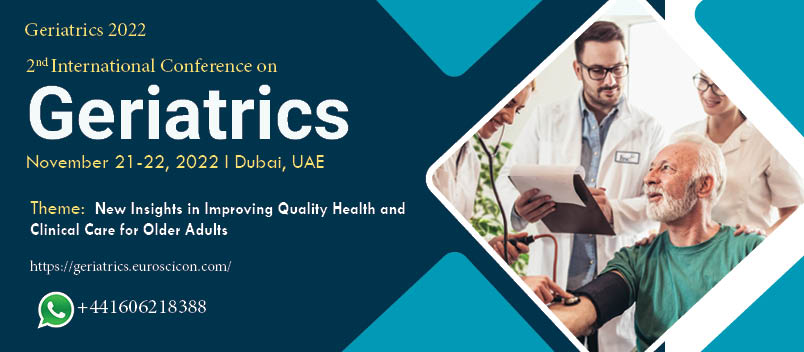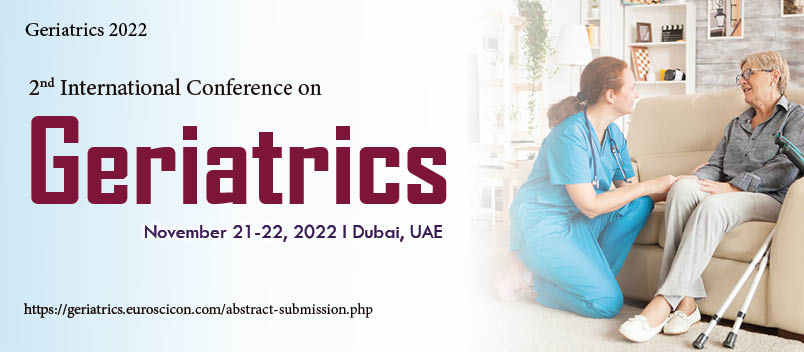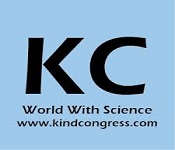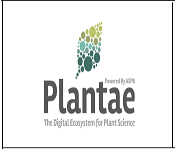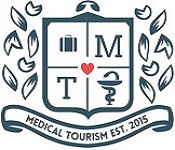Geriatrics Euroscicon 2022
About Conference
On behalf of the 2nd International Conference on Geriatrics, we are delighted to welcome you to join the Webinar scheduled on November 21-22, 2022 Dubai,UAE which is an exceptional gathering for the worldwide prominent scholastics in the field of Geriatrics where Directors, Scientists, Professors, Research scholars, Postdocs, Academic Staff are about to share their research work and acquiesce new emerging technological trends in the conference areas.
Geriatrics-2022 is an International platform to adverse and study about the early detection as well as treatment care based on Professional standards, and intense research to complete cure for whole Healthy Living and Healthy Aging to Promote an Ageless Era. The conference contains significant international experts in Doctors, research scholars and general practitioners, Student Delegates and Exhibitors form all over the world to our webinar with the theme “New Insights in Improving Quality Health and Clinical Care for Older Adults” will be featuring oral presentations, poster presentations, keynote talks, workshops and many more.
The conference will focus on Geriatricians, Dental Professionals, Palliative care specialists, Business delegates, Geriatric Nurses, Physicians, Geriatric Doctors, Community care coordinators, Researchers,Urologists, Geriatric Physicians, Ophthalmologists,Social Workers,Students, Cardiologists, Medical Directors, Pharmacists, GeriatricSpecialist, industryprofessionals, ClinicalGeriatrics, Geriatric Psychiatry.
Scope and Importance:
Geriatrics-2022 aims to discover advances through this conference is to raise awareness about the speed of population ageing and, more generally, about the experience of being old in our changing world and study about the early detection as well as treatment care based on Professional standards, and intense research to complete cure for whole Healthy Living and Healthy Aging to Promote an Ageless Era. The Conference is to give a platform to academicians and practitioners from multiple disciplines to debate and deliberate on social change that is covered by innovation and technology.
Who can attend?
Geriatrics-2022 brings together individuals who have an interest in different fields of Geriatrics and Geriatricians, Dental Professionals, Palliative care specialists, Business delegates, Geriatric Nurses, Physicians, Geriatric Doctors, Community care coordinators, Researchers, Geriatric Physicians, Social Workers, Students, Medical Directors, Pharmacists, Geriatric Specialist,Industry professionals, Clinical Geriatrics. It is a forum to discover issues of mutual concern as well as exchange knowledge, share evidence, thoughts, and make solutions.
Why to attend?
Geriatrics-2022 is one of the world's leading scientific conferences to bring together all the participants to exchange about state of the art Research and Technologies and to bring discoveries of advancing the Elderly Care Practices for Promoting Healthy Aging. Attending International conference is being the Professional Development and to get the current state of research and the challenges to future discovery.
Target Audience:
Geriatricians | Physicians | Geriatric Physicians | Medical Directors | Dental Professionals | Geriatric Doctors | Oncologists | Ophthalmologists | Rheumatologists | Clinical Geriatrics | Cardiologists | Geriatric Nurses | Pulmonologists | Pharmacists | Geriatric Specialist | Occupational Therapists | Healthcare Faculty | Palliative care specialists | Business delegates and industry professionals | Researchers | Students and others interested in the field of Geriatrics.
Sessions and Tracks
Track 1: Geriatrics
Geriatrics is a branch treating old people from disabilities and aging disorders. Geriatrics is a specialty that targets on health care of old/elderly people. Health care includes preventing and treating diseases and disabilities of aged.
Track 2: Geriatrics and Geriatric Medicine
Geriatric medicine is a branch dealing with elderly people disorders, diseases and medication. Geriatric medicine is specialization on health care of old, preventing and treating them. Geriatric medicine needs a team approach of geriatricians, nurse, nutritionist, physician assistant.
Track 3: Geriatric Diseases & Geriatric Treatment
With increasing senescence geriatric diseases are more common. Geriatric diseases are complications arising due to aging. Geriatric diseases are cardiovascular disease, atherosclerosis and cardiovascular disease, cancer, arthritis, Alzeimers disease. The diseases increase with aging Geriatric Treatment is for increasing healthy life span and maximal lonevity and intervention, prevention and treatment of age-related diseases for achieving healthy old age. Geriatric Treatment is treatment of aging and age related diseases like Alzheimer's disease, Dementia, osteoporosis, Diabetes. The incidence of all of these diseases increases rapidly with aging. Geriatric treatment is different for different diseases and disorders caused by aging.
Track 4: Geriatric Services
Geriatric Servies is providing service and caring of older adults. Geriatric service comprise of expert geriatric physicians, social workers, nurse practitioners
Track 5: Geriatric and Gerontology
The increasing geriatric population is coupled with growing number of chronicle aging, biological aging, psychological aging and social aging diseases increasing number of long-term care services drives the geriatric services market size over the forecast timeframe. Gerontology is multidisciplinary and cares with physical, mental, and social aspects and implications of aging. Geriatrics is a medical specialty focused on care and treatment of older persons.
Track 6: Geriatrics and Elderly Care
The elderly population is projected to rise to 12% of the total population by 2025. The increasing elderly population poses social and financial challenges and puts immense strain on the health system due to marked shift toward chronic non-communicable diseases. There is a need to the medical and socio-economic problems of this vulnerable group and promote healthy ageing.
Track 7: Geriatric Dentistry
Geriatric dentistry is the delivery of dental care to older adults involving diagnosis, prevention, management and treatment of problems associated with age related diseases. The mouth is referred to as a mirror of overall health, reinforcing that oral health is an integral part of general health. In the elderly population poor oral health has been considered a risk factor for general health problems. Older adults are more susceptible to oral conditions or diseases due to an increase in chronic conditions and physical/mental disabilities. Thus, the elderly form a distinct group in terms of provision of care.
Track 8: Geriatric Endocrinology and Diabetes
As our population expands, and as life expectancy increases, the number of people in the geriatric age group rises too. All over the world elderly people, i.e., men and women aged more than 65years, constitute a rapidly increasing proportion of the human population.
The two most common endocrine diseases that affect the elderly are diabetes mellitus and thyroid disease. By age 75, about 20% of the population has developed diabetes. 10 As stated previously, diabetes mellitus has known effects on the cardiovascular system, but it also can affect most other organs, most notably the kidneys, peripheral nervous system and, of course, the eyes. Adult hypopituitarism, hypothyroidism, osteoporosis, diabetes mellitus, adrenal insufficiency, various forms of hypogonadism, and endocrine malignancies are all more frequent in old age.
Track 9: Geriatrics Heart Health
Heart disease may be a killer among the aging population. But lifestyle can provide the first line of defense against this debilitating disease. As people age, they typically share two overarching goals: to measure an extended life and to measure a high-quality life. A strategy for achieving these goals is to defeat heart disease before it develops. Age is a major risk factor for developing cardiovascular disease (CVD) for both men and women. During aging, changes occur within the heart that set the backdrop for heart condition. The heart walls thicken and stiffen, preventing the muscle from relaxing and filling adequately between beats. High blood pressure can also occur, further increasing the risk of heart disease and stroke. While age-related changes occurring in the heart can lead to heart disease, it is becoming clear that many of these changes are influenced as much by lifestyle as by age. We’ve known for years that a lot of lifestyle factors like diet, exercise, and smoking are associated with heart condition risk. But recent research underscores just how important these lifestyle strategies are often for lowering the danger of heart condition as we age.
Track 10: Geriatric Nutrition
Old age is one among the vulnerable and prone stages in terms of health status. Nutrition is important determining factor of elderly mass specifically over the age of 60 years. Geriatric nutrition has been always underreported, though everyone wants to form the senescence easy. Adequate nutrition is always important for better ageing. Physical activities also are within the same queue of building the ageing a neater process. Health conditions like hypertension, cholesterol, kidney failure, joint problems and cardiac problems should be taken into consideration before starting any quite physical activity.
It requires lot of awareness, motivation and support, physically, mentally and socially. It is found in the study that by 2050, around 30% of people in industrialized countries will be over 65 years. But, tremendous rise in chronic diseases is increasing the risk of related disorders in elderly. Malnutrition leads to decreased independence due to physical weakness and muscle wasting. It becomes still important in perspective of elderly masses due to physiological changes in the body. Immunity weakens with proceeding age which is influenced by lack of nutrients and differed dietary habits.
Track 11: Geriatric Rehabilitation
The geriatric rehabilitation, that specializes in the particularities that differentiate it from the recovery of younger adults. Elderly patients present an increased prevalence of progressive disabling chronic conditions requiring rehabilitation and that they also are more exposed to acute disability events due to a chronic disease. Rehabilitation is an important component of geriatric care and therapy and it can make a critical difference within the life quality of elderly people, albeit the method is much more difficult and the progress may be slower than in younger adults. The goal of the geriatric rehabilitation is that the recovery and therefore the development of private independence and the ability to try to as many as possible daily living activities.
Track 12: Geriatric Nursing
Geriatric Nursing may be a comprehensive source for clinical information and management advice concerning the care of older adults. The management of acute and chronic disorders and supply practical advice on care of older adults across the future. Geriatric Nursing addresses current issues associated with drugs advance directives, development and management, legal issues client and caregiver education, infection control, and other topics.
Gerontological nursing on knowledge about complex factors that affect the health of older adults Older adults are more likely than younger adults to possess one or more chronic health conditions, like diabetes, disorder, cancer, arthritis, hearing disorder, or a sort of dementia like Alzheimer's disease. As well, drug metabolism changes with aging, adding to the complexity of health needs.
Track 13: Palliative and Community Nursing
Acute medical illness can present at the end of life and contribute to significant distress in patients, their families and their careers. Care models should be ready to assess, treat and support patients with an acute medical illness at the top of life within the setting chosen by patients, which could include home, care home, hospice or hospital.
There is some uncertainty over the clinical and cost-effectiveness of various models of community based palliative care, which may support management of acute medical illnesses at the top of life outside hospices and hospitals. This is important to work out because it offers option to patients and care at an important time of life.
Track 14: Alzheimers Disease and Dementia
Alzheimer’s is a degenerative brain disease that is caused by complex brain changes following cell damage. It results in dementia symptoms that gently worsen over time. Alzheimer’s may be a chronic neurodegenerative disease that sometimes starts slowly and gradually worsens over time. It is the explanation for 60–70% of cases of dementia. The most common early symptom is difficulty in remembering recent events. As Alzheimer’s advances, symptoms get more severe and include disorientation, confusion and behavior changes. Eventually, speaking, swallowing and walking become difficult.
Dementia is not a normal part of aging. It is caused by damage to brain cells that affect their ability to communicate, which can affect thinking, behavior and feelings.
Track 15: Geriatric physical therapy& surgery
Physical therapy is particularly important for adults ages 65 and older as muscles and joints tend to lose strength and stability over time. This change can negatively impact older adults' independence in performing daily tasks and movements, like changing positions, standing, walking, and going up and down stairs
Track 16: Cancer in elderly: Challenges & Barriers
The aging population implies important changes at various levels. From the ancient years to the 19th century, human life expectancy doubled from 20 years to 40 years. However, this life expectancy doubled fast to 80 years from the 19th century to the 20th century and continuously increased in the 21st century.This fact implies important socioeconomic and health challenges. Aging entails a greater need to care for aspects related to primary aging (physical changes due to aging) and to secondary aging (risks increase in old age) undoubtedly, cancer risk increases exponentially with age. About 60% of cancers occur in people 65 years of age or older. Furthermore, about 70% of the deaths caused by cancers occur in this stage. Therefore, cancer is a disease of old age. Taking into account the increase in cancer occurrence and the quality of life among the elderly population, a special approach is necessary for the diagnosis, treatment, and survival of elderly patients with cancer
Track 17: Stem Cells and Ageing
Ageing may be a complex process that involves every cell and organ in the body which results in the deterioration of the many body functions over the lifespan of an individual.
With age, the skin loses its elasticity and injuries heal more slowly than in childhood. The same holds true for bones, which turn brittle with age and take for much longer to heal when fractured. Lung tissue also loses its elasticity and therefore the muscles of the skeletal structure shrink. Blood vessels accumulate fatty deposits and subsided flexible, which ends up in arteriosclerosis. Hence, all ageing phenomena—tissue deterioration, cancer and propensity to infections—can be interpreted as signs of ageing at the extent of somatic stem cells.
Track18: Economic and Social Impact of Aging
Aging of the population affects all aspects of the society including health, Social Security, education, socio-cultural activities, family life and therefore the labour market. They have often also considered how such labour shortages are often mitigated by increasing the retirement age. Regarding care of the elderly, if fertility continues decreasing then this may inevitably cause a scarcity of care workers, both paid and unpaid, especially, for elderly people. The social and economic provision of care still creates gender dilemmas for societies by narrowing the range of employment opportunities for ladies.
Track19: Chronic conditions of the Elderly
Elderly people are often suffering from two or more chronic diseases, more frequently cardiovascular diseases, chronic respiratory diseases, metabolic syndrome and cancer. These most frequent chronic diseases share largely preventable risk factors, the foremost important being smoking and obesity, and should be linked to chronic systemic inflammation. Coexisting chronic diseases affect the course of the first disease and alter the efficacy and safety of its management. Learning to manage a variety of treatments while maintaining quality of life can be problematic and the ageing of the population has increased the prevalence of chronic diseases, which represent a huge proportion of human illness.
Track 20: Mental Illness in Geriatrics
The world’s population is ageing rapidly. Between 2015 and 2050, the proportion of the world's older adults is estimated to almost double from about 12% to 22%. In absolute terms, this is often an expected increase from 900 million to 2 billion people over the age of 60. Older people face special physical and psychological state challenges which require to be recognized.
There could also be multiple risk factors for psychological state problems at any point in life. Older people may experience life stressors common to all people, but also stressors that are more common in later life, like a significant on-going loss in capacities and a decline in functional ability. For example, older adults may experience reduced mobility, chronic pain, frailty or other health problems, that they require some sort of long-term care. All of those stressors may result in isolation, loneliness or psychological distress in older people, that they'll require long-term care.
Track 21: Elder abuse, Law and Rights
Harassment of the elderly is very common, but it remains a largely hidden problem. It is expected to increase in the coming years as many countries face rapid population aging. Senior abuse can prompt serious physical injuries and long-term psychological consequences on them, expanded danger of nursing home placement, use of emergency services, hospitalization and death. The solicitor has a wonderful opportunity to provide support both on a legal set of issues, but also on a lot of pragmatic and practical issues around avoiding problems before it start. These Geriatrics 2018 are some of the elements that deal comfortably in all spheres from pros to cons to combat the burning problem that severely affects those grey hairs in living a healthy, peaceful and happy life
Track 22: Therapeutic approaches on Aging
Therapy helps elders struggling with aging reconversions and finds new sources of pleasure and discovers new support systems. Many older people are also entering therapy to seek treatment for mental health problems unrelated to aging in greater numbers than ever before. This seems to be due to the fact that as awareness grows, attitudes towards mental health issues begin to change
.Track 23: Geriatric psychiatry
Geriatric psychiatry emphasizes the biological and psychological aspects of normal aging, the psychiatric effect of acute and chronic physical illness, and the biological and psychosocial aspects of the pathology of primary psychiatric disturbances of older age. Geriatric psychiatrists focus on prevention, evaluation, diagnosis and treatment of mental and emotional disorders in the elderly and improvement of psychiatric care for healthy and ill elderly patients.
market Analysis
The growing geriatric population intending to live independently is one of the major drivers of the geriatric care services market. The global geriatric care services market is expected to reach USD 1,012.02 billion by 2022, growing at a CAGR of 6.1% over the forecast period. The U.S. population is “graying” at a rapid rate. According to data published by the United Nations in 2014, it has been estimated that by the year 2022, approximately 35% of the population would be above 60 years of age.
the presence of various long-term care services providers coupled with favorable reimbursement policies is few factors expected to boost the growth of the geriatric care services market. Furthermore, an increasing oldest old population who are prone to various medical conditions such as neurological, orthopedic, cardiovascular & respiratory disorders coupled with increasing technological advancement such as the development of specialty robots capable of assisting elderly in carrying out day to day operations are expected to drive the geriatric care services market growth.
